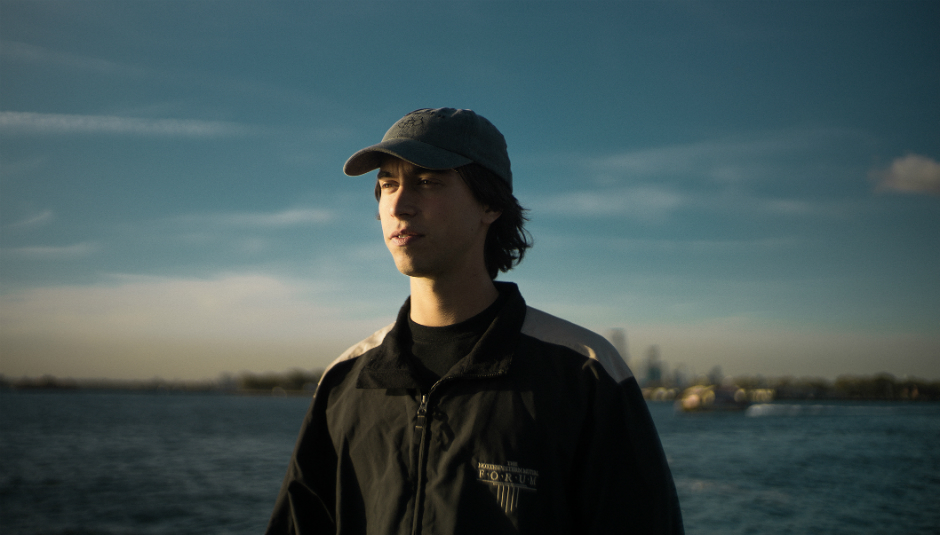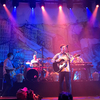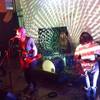Recently, DiS published a Q&A with filmmaker Nicolas Winding Refn, which ended with him saying: “Film should be like music – uncontrollable.” I'm not sure if Refn has every heard of (Sandy) Alex G, but ‘uncontrollable’ is one way to describe the Philly recording artist's latest LP Rocket. With the same foible as genre-bending artists like Ween and Beck, Alex Giannascoli displays a myriad of baffling sonic collages in the span of fourteen tracks. Bucolic country-folk (‘Bobby’, ‘Poison Root’), honeyed Cole Porter jazz (‘County’, ‘Guilty’), noise-laden “hardcore shit shows” (‘Brick’), pixelated Reich-abstractions (‘Horse’), kaleidoscopic avantpop reminiscent of labelmates Animal Collective (‘Witch’)... well, (Sandy) Alex G can simply do it all and do it well.
If the sheer musical range on display tells us one thing, Rocket, like previous Alex G releases, doesn’t intend to follow a certain narrative, stylistic or overarching concept. Giannascoli is the first to attest to that assumption. “There isn’t a narrative to the album, but yeah, within each song there is hopefully something tangible”, he says, fumbling between frequent ‘erms’, awkward pauses, and unfinished sentences over Skype. “The goal is to make people nostalgic. I want people to relate to it. Even though it’s impossible, that’s my goal. If I apply a certain sound, maybe that will be evocative to people in the same way it’s evocative to me.”
There’s an interesting contradiction in (Sandy) Alex G’s already immense catalogue; the free-wheeling nature of his output, plus the contrary idea of that being his way to actually maintain control as opposed to be out of control – to riposte Refn's remark again.
Giannascoli wants to make his songs palpable for his audience, but he doesn’t feel too comfortable enunciating his music explicitly, at least not beyond just general aesthetic or mood. As effortless as writing songs appears to come to him, it’s still difficult to articulate for him why during interviews. Though affable and relaxed in his disposition, doing them isn’t really his forte. He’s keen to call his own bullshit often mid-answer, going out of his own way to debunk any sort of romanticism in what he does. Even when talking about his collaboration with Frank Ocean on Blonde – something most artists would put in capitals on their resume – he’s been (refreshingly) ho-hum and pragmatic. For this article, his publicist politely requested DiS to not ask Giannascoli about Frank Ocean. Because, really, what more is there to say?
Focussing on (Sandy) Alex G's own work is interesting in its own merit. When addressing ‘Witch’, Giannascoli meekly dismisses the song’s amorphous nature as something haphazard. “A lot of people have been relating that song to Animal Collective, but I haven’t listened to them in years. I came up with the guitar parts first. I’ve been listening to a lot of Spanish music on the radio during tours. There was a lot of latin music on the radio all the time, and I’ve been listening to a lot of radio. I wanted it to be this dark latin sounding song. It’s funny, I think I try so hard to make shit perfectly formed, and it ends up accidentally amorphous sounding. Because I’m not that technically good, I’m haphazard in my methods. So it ends up sounding experimental by default. In reality, I was trying to make it sound very tight. Which again, is kind of funny.”
Are there any new tricks you picked up when you were recording Rocket?
To be honest, I still do things the same way as usual, the way I’ve always done it. This album was mixed again by Jake Portrait, who also mixed Beach Music. That added to the professional quality [as he says ‘professional’, Giannascoli’s voice noticeably hesitates, slightly self-conscious about the lack of a better word]. But other than that, I went about recording this one the same way. One new thing was being able to work with Molly Germer, who played some of the violin parts. My brother played keyboard on ‘Proud’. I guess that’s different, having a few other people play on Rocket.
Are you opening up about the idea of collaboration, or do you feel somewhat autonomous still when it comes to recording your own music?
I’m more open to having other people add things I’m not able to do on my own. Like a good bass solo or something, since I’m not a really good bass player. I can’t play the violin either, so I asked Molly. I’m comfortable doing that. But the main reason I do things myself is to maintain control, so I’m not open to collaboration as far as receiving other people’s input. But I am open to utilizing other people’s skills.
I love the rudimentary quality of your music. It sounds like it’s reaching for something, instead of swearing by some sort of artifice.
I don’t think about that too hard. That rudimentary quality just ends up that way because of my lack of skill in one department. Or my lack of ability in a different department. It’s not something I’m consciously striving for. I think that's just a side-effect of doing it yourself instead of in a professional way.
Is there one particular thing you want to become better at?
I’m definitely still learning. My learning curve was really steep maybe a few years ago. I still have a very basic set-up, using GarageBand and a USB mic. If I expand to more professional recording gear, I have a whole lot more to learn. Because I don’t have a clue about that stuff.
Bandcamp home recording artists like yourself, Car Seat Headrest, and Jay Som are accustomed to having an abundance of ideas right there at their fingertips. The transition to translating that to a more practical live set-up sometimes often takes a bit of time. How do you approach that challenge yourself?
I’ve only recently started hearing Car Seat Headrest, so I’m not sure what he’s about exactly. But as far as translating stuff to the live show, it was pretty easy because I’ve been playing in bands since I was a kid basically. When I was fourteen, me and my friend Sam [Acchione, guitarist] started our first band, and we were playing all the time in Philly. Sam still plays with me now. We’ve been doing music so long that it wasn’t a big effort to make it a huge live thing. More like a fun little challenge.
You don’t seem all that concerned with accurately translating song recordings to the live stage. Playing live seems like an opportunity to put a new weird little spin on them.
Exactly. We know it’s gonna be way too hard to play it like I do on the recordings. There are a million different instruments, and they often change within the songs themselves. So we just sort of take a lot of liberties with them.
You just mentioned Sam Acchione, your childhood pal who’s still playing with you. How much does someone’s personality factor into forming a band around you?
It’s not objectively important to me, but it is important in the sense that that’s what I always associated music with. That’s what me and my friends always did together. So I’m used to thinking about it in that manner. It’s important that my bandmates are also my friends, otherwise I think I’d get pretty insecure.
Touring is cumbersome and often times you don’t even profit from it these days. So morale is important I reckon.
Yeah, exactly. That hits the nail on the head.
You yourself probably had your share of low moments on tour, but high moments too. It’s an emotional rollercoaster.
And that is why it’s nice knowing you’re going to have those moments with people without severing your connection. You can tell what the other band members are feeling, because you know them as people. If I played with people I hardly knew, I’d be hung up because I wouldn’t be able to feel them out.
One of the first live clips I saw of you was that video on The Fader of you playing ‘Icehead’. You started screaming your lungs out out of nowhere. I was like: ‘Whoa, didn’t expect this!’, because your recordings sounded so subdued. It made me uncomfortable in this really cool way. When you’re around friends you can be bold on stage like that, I imagine.
Everyone is usually on the same page during shows. If you want to get weird, you’re free to mess around a little more. I think I’m getting a little self-conscious, but I feel it’s important making people feel a bit on edge. When I go to a show myself, that’s something I’m always looking for. I’m a little bit self-conscious about it now because I don’t want to make a fool of myself either.
You say ‘fool’ as if it’s something negative, but I always admire artists who are willingly the fool. Does that make any sense?
I agree when people can be a fool, but sometimes they don’t realize when I’m being one. That they just think I’m some asshole. Sometimes I might say something that would hurt someone’s feelings. I don’t want to make people feel that I’m attacking them or something. I don’t want to project any negative energy, so I have to rethink about how I want to be confrontational and weird.
You have these amazing unreleased songs scattered across the internet. ‘Be Kind’ for instance, is incredibly heartfelt. But you haven’t been bothered yet to release that song as a proper album track; it’s only heard in this amateur YouTube footage. Are you content with certain songs just existing exclusively in certain environments?
I thought the video for ‘Be Kind’ was good enough. Before that happened, I had made previous attempts to record the song, but once I saw that video I ended up ditching the song. Because I felt that video captured it better than a recording ever could. So I figured, why bother keep on trying to record it, if I want to achieve what the video already achieved? The people who enjoy the video might only be disappointed by the recorded version. So I might as well just leave it at that.
I think a lot of people who like to hear that song re-recorded actually. But I also respect the artist’s choice to leave it in a certain place where it can be enjoyed on his terms.
I see why recording it would be good, but I just don’t think I’d do as good a job capturing it the way that video did.
That’s an interesting point because a lot of music online revolves about songs being in certain playlists and streaming services. The common advice is that you should have music available on as many streaming services as possible. But I mean, I like it whenever artists make up their on rules in that department.
Yeah, I like that too actually. Occasionally, I enjoy uploading music on YouTube that I won’t release on a record, just because I like putting out songs without it automatically being about selling them. It goes back to when I was making music as a kid; it was about making it with nothing necessarily attached to it.
You said in a previous interview that you’re reluctant to “idiotsplain” meanings behind songs. I recently stumbled on this article about William S. Burroughs’s Cut Up method, how he found juxtapositions of words from different sources, to create a core emotion or aesthetic that feels like a raw extension of the individual. Your music reminds me of that.
That makes perfect sense, I think you’re totally about right about that! To me, it’s about gut feeling. My music isn’t as calculated as people might think. I don’t pick my songs out of a hat either, but I still don’t go about writing song with everything laid out in my head already.
Do you feel prolific musicians like yourself have a hard time keeping people’s attention span because the novelty of such a large output wears off in time?
I’m not really thinking about the timing of my album releases or anything like that, no. I’m fine releasing five albums at once or whatever. If they’re decent albums, eventually people will figure it out sooner or later. I think I’m slowing down, just because I’m more critical of myself now than I used to be. That makes the process way slower. It gets harder to be excited about something I’m making because I’m more self-critical.
You’re 24 now instead of 21, easing into adulthood. It will be increasingly awkward to sing about angsty stuff, generally speaking. How are you feeling about that?
It’s tricky. A lot of music I used to make was angsty in that selfish way when you’re young and you feel like a victim. If you’re not forced to take responsibility for things, you tend to make people feel bad for you. For a good chunk of those old songs, I was maybe subconsciously being the victim. Nobody is dumb enough to transparently ask for pity or attention. But that’s probably what the older stuff was about when I was still a teenager. Now that I’m older I feel like I’m totally in control of my life. I no longer want to be treating stuff like it’s out of my control. I want to convince myself otherwise. To no be so selfish lyrically.
Rocket is out now via Domino. For more information about the artist, please visit his offical website.
Photo credit: Tonje Thilesen






















